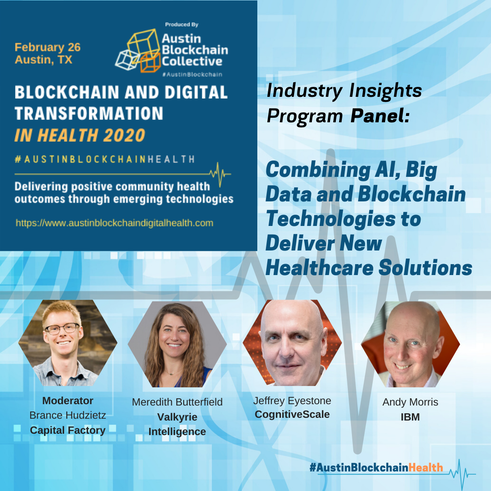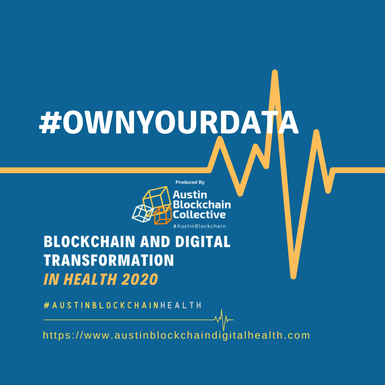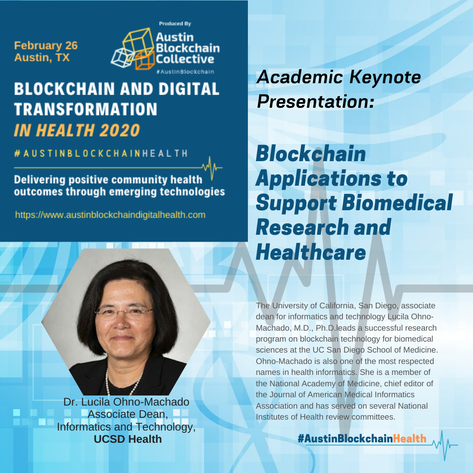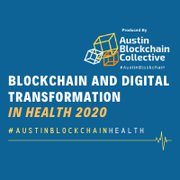 The next decade will see artificial intelligence and machine learning in healthcare emerge to make a fundamental impact in areas such as diagnosis of conditions, analysis of patient datasets for drug discovery and delivery of wellness services. On Wednesday, February 26 at the first Blockchain and Digital Transformation in Health 2020 symposium IBM’s Product Marketing Manager, Machine Learning Andy Morris joins Meredith Butterfield, PhD, Principal Scientist, Valkyrie Intelligence and Jeffrey Eyestone, Healthcare AI Advisor, CognitiveScale for the “Blockchain in Healthcare and Life Sciences: The End of the Beginning” panel moderated by Capital Factory’s Ambassador of Emerging Technologies, Brance Hudzietz. New healthcare applications are emerging that leverage breakthroughs in artificial intelligence and machine learning technologies to deliver improved health outcomes and processes for providers and payers. This panel will discuss how AI/ML is being leveraged, and the role of big data and even blockchain in making them robust, responsible and secure. Blockchain and Digital Transformation in Health 2020 symposium’s full educational program includes more than 40 expert speakers, 10 academic presentations and 20 blockchain/healthtech startups. More than 100 senior healthcare industry and technology professionals are expected to attend. The symposium is especially targeted at those working in the following roles:
The venue for the Blockchain and Digital Transformation in Health 2020 Symposium is MedtoMarket, a recently opened medical and life sciences innovation center. Registration for the symposium is open, with an academic rate of just $295 (including the educational program plus networking breakfast, lunch, breaks and end of business reception). Discounts are available for Dell Med and UT faculty and students, as well as for healthcare associates of Dell Med and members of the Austin Blockchain Collective.
0 Comments
 Health data rights are a focus issue at the Blockchain and Digital Transformation in Health 2020 symposium featuring blockchain and Web 3.0 startups and academic researchers AUSTIN, TX, February 11, 2020 — With healthcare evolving rapidly to become a data-centric business that supports clinicians in their endeavors to deliver improved patient outcomes, so issues related to ownership, usage and monetization of individuals’ data have reached critical importance. In particular, there is elevated public awareness of the #OwnYourData movement, which to date has focused on harvesting of personal data via social media platforms and smartphone apps for targeted advertising. As centralized Big Tech companies roll out initiatives in the health, wellness and life science spaces, so individuals are increasingly wary that their private, high value health data might be misused or exploited for drug discovery and other applications without their permission and with no compensation. These and related issues that contribute to the “Healthcare as a Data Business” narrative will be explored at the Austin Blockchain Collective’s Blockchain and Digital Transformation in Health 2020 symposium to be held on February 26, 2020, featuring an educational program curated jointly with data and clinical experts from Dell Medical School at The University of Texas. The symposium – which is one of the first activities in the Austin Blockchain Collective’s 2020 Focus Program on Decentralization and Web 3.0 for Business Applications – features a number of presentation and panel sessions that will both introduce and deep dive into healthcare data issues and blockchain’s technology response, including: “What Healthcare Can Learn from Wall Street” – Austin Blockchain Collective’s Pete Harris discusses business approaches for a market where “Information about money has become almost as important as money itself” and suggest parallels that might apply in healthcare. “Web 3.0 is Emerging – Is the Future of Healthcare Decentralized?” – a panel featuring participants already leveraging public blockchains for their healthcare initiatives, including: Heather Flannery, Global Leader at ConsenSys Health; Todd Chamberlain, Co-Founder & CEO of MedBlox; and Brennan Hodge, CEO of Citizen Health. “Leveraging Blockchain Within Scalable and Regulatory-Compliant Health Information Architectures” – explores how to build patient information systems that respect regulatory requirements for data access and sharing. Panelists include: Brian Jackson, Co-Founder of BurstIQ; Nathan Miller, CEO of Consensus Networks; and Travis James, CEO at Tribe Health Solutions. “Smart Contract Technology Innovation and Applicability to Healthcare Applications” – features Corey Todaro, Senior Segment Lead for Healthcare at Digital Asset, who will describe how its DAML smart contract language allows the rapid development of applications that support HIPAA-compliant processes. “Healthcare as a Data Marketplace – Enabling #OwnYourData and Monetization Strategies” – is a panel of startup leaders that are at the forefront of delivering business models that allow patients to own and monetize their health and genetic information. Participants include: Aman Quadri, CEO of AMSYS Blockchain & AMCHART; David Koepsell, Co-Founder & CEO at EncrypGen; and Tatyana Kanzaveli, CEO of Open Health Network.  On Wednesday, February 26th at the first Blockchain and Digital Transformation in Health 2020 symposium curated jointly by the Austin Blockchain Collective and data and clinical experts from Dell Medical School at The University of Texas, IBM’s Blockchain Solutions Leader for Healthcare and Life Sciences Mark Treshock is to present the industry keynote: “Blockchain in Healthcare and Life Sciences: The End of the Beginning”. His presentation explores a new decade faced with tremendous challenges, but also unprecedented opportunities in healthcare. The presentation asks how emerging technologies like blockchain together with AI, IoT, quantum computing and others will make the ‘Roaring Twenties’ the decade of healthcare transformation. Mark Treshock is IBM’s Global Leader for Blockchain Solutions in Healthcare and Life Sciences. Mark has spent his career helping companies and their customers benefit from digital transformation and is passionate about Blockchain’s potential to transform industries. He has presented on how Blockchain and Analytics can transform the pharmaceutical supply chain at the White House and on Capitol Hill. Mark lives in South Florida and has a MBA from Cornell, a MS in Computer Science from Columbia University, a MPS in Interactive Media from New York University, and a BA from the University of Pennsylvania. Blockchain and Digital Transformation in Health 2020 symposium’s full educational program includes more than 40 expert speakers, 10 academic presentations and 20 blockchain/healthtech startups.  This academic keynote presentation, by the University of California, San Diego, Associate Dean for Informatics and Technology Lucila Ohno-Machado, M.D., Ph.D., will review various proposed healthcare applications of blockchain technology, and present some applications being pursued that emphasize blockchain capabilities as a distributed immutable ledger and smart contracts manager. It will also discuss opportunities and challenges in introducing this decade-long technology into the healthcare informatics/information technology cultures. Lucila Ohno-Machado, MD, MBA, PhD received her medical degree from the University of São Paulo and her doctoral degree in medical information sciences and computer science from Stanford. She is Associate Dean for Informatics and Technology, and the founding chair of the UCSD Health Department of Biomedical Informatics at UCSD, where she leads a group of faculty with diverse backgrounds in medicine, nursing, informatics, and computer science. Also, she is the PI for the California Precision Medicine Consortium for the NIH “All of Us” Research Program. Prior to her current position, she was faculty at Brigham and Women’s Hospital, Harvard Medical School and affiliated with the MIT Division of Health Sciences and Technology. Dr. Ohno-Machado is an elected member of the American College of Medical Informatics, the American Institute for Medical and Biological Engineering, the American Society for Clinical Investigation and the National Academy of Medicine. She served as editor-in-chief for the Journal of the American Medical Informatics Association from 2011 to 2018. She directs the patient-centered Scalable National Network for Effectiveness Research, a large clinical data research network covering more than 30 million patients and 12 healthcare systems, and was one of the founders of UC-Research eXchange, a clinical data research network that connected the data warehouses of the five University of California medical centers.  Following the morning Symposium Welcome by Pete Harris, Executive Director, Austin Blockchain Collective and Anjum Khurshid, Director of Data Integration, Department of Population Health, Dell Medical School at the University of Texas, Mr. Harris will deliver scene setting thought leadership titled “What Healthcare Can Learn from Wall Street.” In his remarks, Mr. Harris will contend that as the healthcare business increasingly becomes a data centric one, it might do well to learn from the decades of experience that has informed the strategic direction of players in the global financial markets, where “Information about money has become almost as important as money itself.” Pete Harris brings his 40+ years of business and technology experience, which has often involved tracking emerging technologies from their R&D phase to commercial launch. Pete has extensive experience of industry applications, especially in the institutional financial markets, supply chain and healthcare. The first Blockchain and Digital Transformation in Health 2020 symposium is being curated jointly by the Austin Blockchain Collective and data and clinical experts from Dell Medical School at The University of Texas. Austin Blockchain Symposium to Address if Blockchain Tech Can Help Solve Health Care’s Data Problems2/7/2020 By Anjum Khurshid, M.D., Ph.D., Director of Data Integration, Department of Population Health, Dell Medical School  At the annual meeting of the Office of National Coordinator for Health Information Technology in Washington, D.C., the secretary of Health and Human Services declared that even he could not get access to his patient records. This may have surprised a few but not anyone who has either dealt with multiple caregivers or someone in the business of health information technology. However, it does present a stark reality that even those who are well-informed and have actual regulatory authority of the government of the United States are unable to get what is considered a fundamental right of a patient, not to mention such complete records being essential for coordinated and efficient care. The other rather unfortunate aspect of the situation is that no one is claiming this issue will be solved in the very near future. We will make some progress on this, but, particularly as it relates to patients having access and control over their own medical data, it is still an elusive target. Federal policies including the 21st Century Cures Act and the newly released 2020-2025 Federal Health IT Strategic Plan keep reiterating the emphasis on patients’ right to access their data, but there is little to show on the ground. Most of the reasons why our health care system is so fragmented and why patients find it so hard to navigate and get access to their own medical data are deep-rooted in the culture, structure and business of health care. However, there are also a number of technical hurdles related to data privacy, security and exchange that have yet to be addressed in a way that protects individual privacy and confidentiality while at the same time makes access to that information easy and ubiquitous. Blockchain technology is increasingly being considered as an avenue that may solve some of these deep-rooted issues in a disruptive and innovative way while promising individual ownership and control over personal data. How blockchain technology may address these problems and what applications are being developed for use in health care are research topics that are squarely in line with Dell Medical School’s mission to rethink health and promote innovation in medicine using technology. Fortunately, there is a very relevant event in Austin on Feb. 26 that will cover these questions and more. Organized by the Austin Blockchain Collective, the representative group for some 120 blockchain companies in Austin, the Blockchain and Digital Transformation in Health symposium offers a unique academic and industry forum on this topic. I want to particularly encourage fellow academics, researchers and health professionals who want to learn more about these new technologies and their applications in health care to consider attending this symposium. The academic track of the symposium includes leading experts from The University of Texas at Austin and Dell Medical School, who will present existing work and future opportunities for research. I am particularly excited to hear the academic keynote by the University of California, San Diego, associate dean for informatics and technology Lucila Ohno-Machado, M.D., Ph.D. She leads a successful research program on blockchain technology for biomedical sciences at the UC San Diego School of Medicine. Ohno-Machado is also one of the most respected names in health informatics. She is a member of the National Academy of Medicine, chief editor of the Journal of American Medical Informatics Association and has served on several National Institutes of Health review committees. The academic presentations will include blockchain applications in prevention of HIV, generation of real-time scientific evidence, identity management for people experiencing homelessness and clinical topics in neurology and medicine. Research related to health care operations, price transparency and data analytics using new technologies will also be presented. The academic sessions will present opportunities for collaboration among faculty from different disciplines as well as engage industry experts to identify academic partners who may help in developing viable, robust solutions for the market. The symposium is offering special registration rates for faculty and students from The University of Texas at Austin and health care organizations affiliated with Dell Medical School. By Pete Harris, Executive Director, Austin Blockchain Collective  I’ve known for a long time that healthcare relies on data in order to operate (no pun intended) effectively, safely and efficiently. It’s also been apparent that current processes to capture and share data are pretty much broken — one example that most patients can relate to are badly designed paper forms, usually partially completed with bad handwriting, and then faxed between providers. Some of it might end up being manually entered into an EMR system, mistakes and all, which of course can’t communicate digitally with similar systems at other providers. All that paper, manual processing and silo-ed databases will need to change, and not just to make healthcare delivery more efficient and less costly for payers and providers, and to offer better outcomes for patients. Here’s why … Healthcare is rapidly becoming a data-centric business. Not a data-driven business. Healthcare is a data business, as much as Bloomberg is, Carfax is, Google is. Its future lies as a vast big data business that just happens to leverage data in its attempts to help humans with their health challenges and make a profit doing so. Note: The central role of data in healthcare is a core topic of the Blockchain and Data Transformation in Health 2020 symposium. As Pamela Spence, Ernst & Young’s Global Leader for Health Sciences, Wellness Industry and Life Science, puts it: “We are moving from an era where health was a clinical science informed by data to one in which it is a data science supported by clinicians focused on individualized treatment.” It goes without saying that blockchain technology will play an important role in this digital transformation, helping to secure datasets, acting as a platform to aggregate and share data and perhaps also supporting cryptocurrencies that reward those (people and IoT devices) that provide their data and entities that process it. Of course, healthcare is not the only big data business that touches our daily lives often without affected individuals realizing. The more savvy among us have come to learn how major websites like Facebook, Google and Twitter as well as many smartphone apps harvest our data (often with our permission, provided unwittingly), and then sell it to advertising tech companies so that they can create profiles of individuals and target them with influential online advertising for their consumer product clients, political campaigns and even criminal enterprises. World Class Keynotes from UCSD Health and IBM Kick Off Program Combining Academic Research and Insights from Innovative Blockchain and Healthtech Startups
AUSTIN, TX, January 27, 2020 — The Austin Blockchain Collective today announced its first Blockchain and Digital Transformation in Health 2020 symposium to be held on February 26, 2020, and featuring an educational program curated jointly with data and clinical experts from Dell Medical School at The University of Texas. The complete list of program includes two keynotes that will kick off the day and emphasize the unique academic and industry partnership of the symposium:
Among the academic research presented will be papers covering HIV prevention, managing stroke and delirium in hospitals, patient identification and consent systems, providing care to those experiencing homelessness, and generating updated evidence from published medical literature. “We are excited to have a number of outstanding researchers and academics share their expertise to highlight issues of great significance for the future of blockchain technology in health at the symposium,” noted Anjum Khurshid, Director of Data Integration, Department of Population Health, at Dell Med. “Bringing together UT Austin and Dell Med’s academics with Austin Blockchain Collective members will spawn a unique partnership where clinical experts work with technology experts to develop innovative solutions to major healthcare problems.” Industry insights and case studies will extend to a range of topics, including the creation of healthcare consortia, the management of clinical studies and trials, pharmaceutical supply chain traceability and visibility, management and integration of patient health information, reinventing current payer/provider/patient models and medical device lifecycle management. Technical focuses will consider public blockchains, decentralized applications and Web 3.0 architectures, the use of smart contracts for healthcare applications, and designing scalable and regulatory-compliant information architectures. “A particular topic for discussion will be the emerging narrative that positions healthcare as fundamentally a data science discipline, and which acknowledges the commercial value of health-related data,” said Austin Blockchain Collective Executive Director Pete Harris. “As Big Tech companies become increasingly involved in managing and leveraging health data, so data ownership, privacy and monetization issues and strategies have come to the fore, and blockchain and Web 3.0’s role in addressing these will also be explored.” Emphasizing the forward looking philosophy of the symposium, many blockchain and healthtech startups are contributing to the program, including AMCHART, BloqCube, BurstIQ, Citizen Health, Consensus Networks, ConsenSys Health, Digital Asset, EncrypGen, HASA, Lonestar Life Sciences, MedBlox, MedtoMarket, Open Health Network, Rymedi, Spiritus, Synerzip and Tribe Health Solutions. More than 100 senior healthcare industry and technology professionals are expected to attend. The symposium is especially targeted at those working in the following roles:
Registration for the symposium is open, with an academic rate of just $295 (including the educational program plus networking breakfast, lunch, breaks and end of business reception). Discounts are available for Dell Med and UT faculty and students, as well as for healthcare associates of Dell Med and members of the Austin Blockchain Collective. About the Austin Blockchain Collective The Austin Blockchain Collective has a mission to promote the City of Austin's credentials as a recognized global center of business, innovation and thought leadership in the blockchain technology space. Visit https://www.austinblockchaincollective.com to learn more. MEDIA CONTACT: Jen Massing Harris Massing PR, LLC for Austin Blockchain Collective +1 917 293 2405 [email protected] |
NewsTune in here for latest Symposium news and thought leadership. ArchivesCategories |



 RSS Feed
RSS Feed
